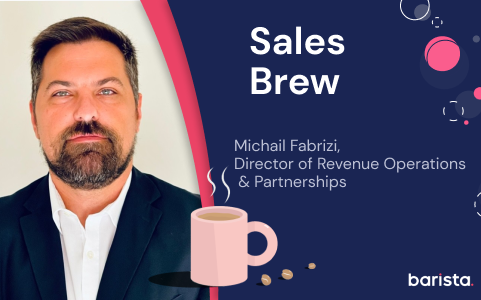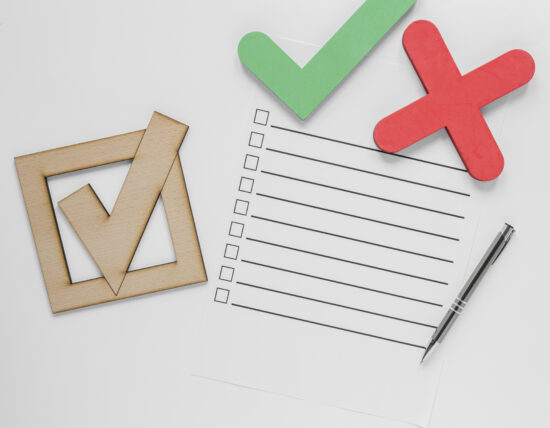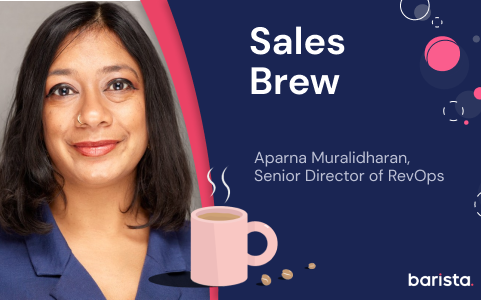CRM data hygiene - Sales Brew with Taylor Thomson, Director of Revenue Operations

Roy Weinstock
For the 10th episode of Sales Brew by barista AI, we had the opportunity of hosting Taylor Thomson, a Revenue Operations leader at Within to talk about CRM data hygiene. We had a great discussion about CRM data quality, strategizing and orchestrating revenue data, and how to streamline data entry tasks for reps.
To watch the full interview and get updated on every sales brew episode, subscribe to our YouTube channel. A short version and transcription are below. Get a cup of coffee and enjoy the show!
How did you get into Revenue Operations?
I ended up in revenue operations in a roundabout way. I started at my current company, which is a digital marketing company that provides paid media management and creative content production for large direct-to-consumer businesses. I joined the company over three years ago to build out our business development organization. As a business development leader, I helped to construct an inbound and outbound sales engine by building our BDR team.
While building out that function, we realized that there were some gaps in how we were integrating marketing, sales, business development, account management, and partnerships. There was some misalignment in terms of how we were tracking goals, the systems we were using, and how teams were communicating with each other.
So about two years ago, we formalized the revenue operations department to allow us to more effectively integrate and manage the analytics, enablement technology, stack, and process development for the whole revenue organization. With my experience as a salesperson, account manager, BDR, and BDR leader, I found the best way for our business to get the most seamless customer acquisition and conversion flow from unknown target accounts to converted clients that we are now trying to develop and grow into recurring revenue.
What are the most urgent CRM data hygiene challenges you’re always facing?
We use Salesforce like a lot of people, and while I love it, any CRM platform is always a challenge to orchestrate CRM data when you start to grow and scale. One of the biggest challenges we face is balancing the amount of information and data we want to collect with how challenging it is to get that information into the system. We want good CRM data hygiene and collection, but it’s not necessarily the priority for our salespeople when their focus should be on closing new business, which can lead to CRM data leakage.
Another challenge is that we’re a lean team that has grown quickly. We’ve had to decide what the next best thing is that we can do to scale and grow more efficiently, but we need to make sure that any tool we add aligns with the systems we’ve already built.
From an architecture and tech stack perspective, one of the biggest challenges I see in revenue operations is making sure that all the systems play nicely together. It can be challenging when the best system or technology out there doesn’t integrate well with what we already have. Ultimately, we need to find ways to become more efficient in our process, identify urgent challenges, and align ways to solve them while keeping our focus on our core business objectives.
Why CRM data hygiene and contact data is important for revenue operations?
In revenue operations, CRM data hygiene and contact data are crucial for a variety of reasons. Firstly, it helps to create consistency and accuracy of information, which is essential for reporting and analyzing metrics like close rates, conversion rates, and buyer personas. With accurate and complete data, teams can better understand their prospects and customers, identify trends, and optimize their sales and marketing strategies accordingly. Capturing sales activity data is crucial for CRM data hygiene and contact data hygiene
Secondly, good data hygiene ensures that all customer interactions are captured and tracked, including conversations outside of normal sales channels. This provides a more holistic view of the customer journey and allows teams to personalize their outreach and engagement with customers, leading to more meaningful and successful interactions.
Finally, with the growing complexity of the customer buying journey, having good data hygiene is more important than ever before for managing revenue data. It enables teams to identify and respond to customer needs more effectively, build stronger relationships, and ultimately drive revenue growth. Without it, teams risk losing valuable insights and opportunities, and their ability to convert and learn from past experiences is greatly impeded.
How do you incentivise reps maintain CRM data hygiene?
Incentivizing reps to maintain CRM data hygiene is important, and there are two theories behind it. Some people believe that withholding commission is the easiest way to incentivize reps, but I don’t think that works well. Instead, I find it more successful to create holistic alignment by creating data transparency and demonstrating how accurate data impacts the business down the line. For example, accurate data is integral in financial forecasting and impacts win rates, closing percentages, hiring, growth rate, and overall perception of the business.
Salespeople are motivated by closing deals and earning commissions, but it’s important to show them how accurate data will impact their personal success and the company’s success. By bringing reps into the fold of revenue operations, we can incentivize them to maintain CRM data hygiene. It’s also important to make it easy for them to enter information and update stages so that it becomes a seamless process for everyone. Ultimately, the goal is to be successful as a unit in growing the business.
Can you elaborate on CRM data entry protocols you have?
In terms of CRM, we’ve implemented scalable automation around our sales processes and built protocols for onboarding. Initially, onboarding was a very manual process because our business wasn’t built on a CRM basis. We began working with Salesforce only about three years ago when I started, and since then, we’ve been scaling up the architecture while still accommodating people who have been with the company from the start. This has led to some friction between the old way of doing things and the new, more scalable approach.
To address this issue, we’ve created automation on the back end, including email and direct integration with our various systems, to streamline the information that our salespeople input throughout the entire process. This, together with implementing CRM duplicates tools, has eliminated duplicative efforts, which has been a significant source of friction in the past.
For example, when a salesperson had to input billing information, they would have to repeat the same step later on, which was time-consuming and frustrating. We’ve simplified this process by having salespeople enter that piece of information once, and it’s automatically sent to the appropriate teams at each stage of the sales funnel. This ensures that all the teams that need that information at different points in the sales process receive it without salespeople having to input it multiple times.
Our legal team needs billing information early on, and our finance team requires it when we close the deal. Having salespeople input the information once means they won’t have to do it again, which helps us become more efficient. This also incentivizes the sales team to input the information correctly and consistently, knowing that they won’t be asked for it later by a random person in digital media operations.
We work closely with the sales team to optimize internal communication and build a structure that rewards early and consistent input of information. This structure helps us become more efficient, and it’s important to have this partnership between different teams to achieve this goal. As the Revenue Operations Manager, I’m here to help create this structure of information distribution, and it’s been instrumental in improving our processes.
What CRM process should be automated and what should stay manual?
It’s a problem when a process is bad, and if you automate that, you just create more issues. There’s always going to be a manual component. In a perfect world, nobody ever has to enter anything ever. But I don’t think that’s possible because there’s always something that someone needs to enter or check, like quality control or making sure that the email address is correct.
It’s never going to be possible to have a perfect state where nobody ever has to enter any information into any system ever, because the system can’t magically pull information from someone’s brain.
I think finding the balance between what should be automated and what should stay manual is key. We need to identify the highest impact manual inputs that automation can’t solve for, such as specific billing information we get manually from clients, like a specific email that our invoices need to go to, or highly customized contract terms that don’t work well within a CRM architecture.
Once we’ve identified these inputs, we need to sequence them so that we can minimize the amount of time that the salesperson or the representative spends in the platform, and then scale out that automation so that they don’t have to do it in multiple systems or at multiple touchpoints.
How do you like your coffee?
How do I like my coffee? Black. Basically. If I could have it any blacker than it is in the cup, I would. But I’m a big coffee guy. I worked at a coffee shop when I was younger.I drank a lot of caffeine at that job, which probably isn’t helping me now. Sometimes I’ll have an espresso with a little bit of almond milk in it or something like that, but usually I like it black.
To watch more from Sales Brew about CRM data hygiene and more:
- Episode 1: Sales Brew with Tyler Meckes, Account manager at Dooly
- Episode 2: Morgan J Ingram, Director of Sales Execution and Evolution at JB Sales
- Episode 3: James Buckley, Chief Evangelist and Master of Ceremonies at JB Sales
- Episode 4: Nieka Mamczak, Head of Sales Enablement at StackOverflow
- Episode 5: Sam Sweeny, Sales Operations Manager
- Episode 6: Benjamin Roach, Global Sales Operations Manager at Ardoq
- Episode 7: Elgun Aliyev, Salesforce Admin at CentralReach
- Episode 8: Amanda Harwood, Sales Operations Manager
- Episode 9: Jake Rasmussen, Salesforce Consultant
- Episode 10: Taylor Thomson, Director of Revenue Operations at Within


